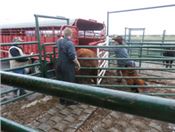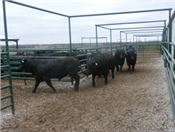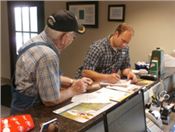Livestock Specialist Reviews Results Of Spring 2016 Bull Soundness Clinic
MT. VERNON, MO.
The five University of Missouri Extension hosted bull breeding soundness exam (BSE) clinics wrapped up on March 24. The overall fitness of the 221 bulls that were examined was consistent with the long-term average of 10.4 percent failing or being deferred for a second check. Usually the second exam is given in three weeks.
The BSE clinics are an effort to educate beef cow-calf raisers of the benefits of having their bulls checked one to two months prior to the beginning of the breeding season.
“Just because a bull bred all the cows in a nice, close-knit fashion in 2015 doesn’t insure he will do the same this year. The BSE serves as an insurance policy against a strung out calving season which makes for an uneven set of calves to sell,” said Eldon Cole, livestock specialist with University of Missouri Extension.
A real game-breaker is when the bull is sterile and fails to breed any cows. Bull problems can occur on any age of bull.
During the clinics this spring, the bulls examined ranged in age from 10 months to 10 years with an average of about three years.
“The 10-year old is a rarity but he passed the exam. His percentage of normal sperm was barely acceptable at 76 percent. To pass a bull must have 70 percent or greater normal sperm in the semen sample,” said Cole.
The 23 bulls that did not pass their BSE failed because of a variety of reasons: low numbers of normal sperm, small scrotum size, failure to provide a semen sample after several attempts, penile issues, hoof problems, or a high amount of white blood cells in the semen indicating an infection.
Not all veterinary clinics have a scale but weights were collected on 191 head and the bulls averaged 1449 pounds. The range went from a young bull weighing 734 lbs. to a 2642 pounder.
“As you might expect, Angus had the most numbers at 111 head. The next highest numbers were Red Angus with 19 head. Charolais followed with 17 bulls and there were 15 Herefords with several of those being Polled. There were 13 different breeds and/or crosses represented,” said Cole.
Trichomoniasis remains a health concern for cattlemen in this area. It is a sexually transmitted disease that Cole says can wreck a calf crop percentage with no visible symptoms in the bull.
Fifty-three of the bulls in this spring’s clinics were tested for the disease. All were negative according to Cole.
“The BSE clinics provide a thorough check on each bull but one feature not doable is evaluation of their libido. The owner of the bulls is expected to observe them after turnout to see if they can and do actually breed females,” said Cole.
Cole recommends that owners write down dates and cow identification when cows were serviced and observe them closely 18 to 21 days later.
Observations of the bull for eye problems, sore feet, penile injuries, failure to shed and persistent pond standing could also be causes of poor breeding performance.
This spring’s BSE clinics were a cooperative effort of the following: Barry County Vet Services, Cassville; Dake Veterinary Clinic, Miller; Countryside Animal Clinic, Aurora; Christian County Veterinary Service, Clever; the Animal Clinic of Diamond, Diamond; Zoetis and University of Missouri Extension. ∆

An unwilling bull
Photo credits: MU Extension

Group of bulls coming in

Paperwork